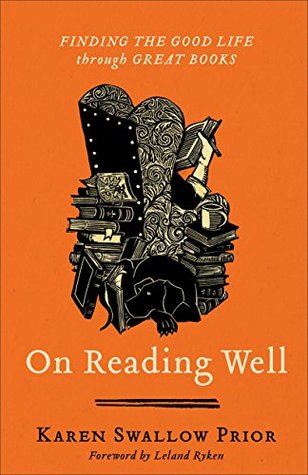More on this book
Community
Kindle Notes & Highlights
Read between
July 12 - August 4, 2020
I retell in the pages of Booked how, by reading widely, voraciously, and indiscriminately, I learned spiritual lessons I never learned in church or Sunday school, as well as emotional and intellectual lessons that I would never have encountered within the realm of my lived experience.
David liked this
The attentiveness necessary for deep reading (the kind of reading we practice in reading literary works as opposed to skimming news stories or reading instructions) requires patience. The skills of interpretation and evaluation require prudence. Even the simple decision to set aside time to read in a world rife with so many other choices competing for our attention requires a kind of temperance.
David liked this
read well is not to scour books for lessons on what to think. Rather, to read well is to be formed in how to think.
Reading well adds to our life—not in the way a tool from the hardware store adds to our life, for a tool does us no good once lost or broken, but in the way a friendship adds to our life, altering us forever.
Yet we know from real-life relationships and experience that how something is communicated is just as important as, if not more important
than, what is communicated.
Reading virtuously requires us to pay attention to both form and content.
the characters’ humanity, their individual personalities, and their involvement in the circumstances depicted in the plot.”
In other words, plot reveals character. And the act of judging the character of a character shapes the reader’s own character. Through
Taylor says that “we learn from fiction in something like the way we learn directly from real life.”
So while reading for virtue means, in part, reading about virtue, in a deeper, less obvious way reading literature well is a way to practice virtue.
Reading literature, more than informing us, forms us.20
Since history is restricted to what was and philosophy to what could be, Sidney argues, literature exceeds both by offering a picture of what should be.
Excellence, then, is not an act but a habit: “the good of man is a working of the soul in the way of excellence in a complete life . . . for as it is not one swallow or one fine day that makes a spring, so it is not one day or short time that makes a man blessed and happy.”23
Similarly, we can hardly attain human excellence if we don’t have an understanding of human purpose. Human excellence occurs only when we glorify God, which is our true purpose. Absent ultimate purpose, we look for practical outcomes.
“moral judgments are nothing but expressions of preference, expressions of attitude or feeling.”24 In other words, without an external, objective source of meaning and purpose, we are left with only our internal and subjective feelings.
Satire points to error, and allegory points to truth, but both require the reader to discern meaning beyond the surface level.
Words carry resonances that spill beyond the bounds of logic and even conscious thought.
desires that are cultivated by books (and other forms of stories, including film, songs, and especially commercials) can pull us toward the good life—or toward false visions of the good life
“The ultimate test of a book, or of an interpretation, is the difference it would make in the conduct of life.”38
Our actions, our decisions, and even the very perceptions we register in our consciousness have been primed by the larger story—of our family, our community, our culture—in which we imagine ourselves.43
Great books offer perspectives more than lessons.
Reading and interpreting literature notoriously lacks hard and fast rules.
There is no one right reading of a literary text—but there are certainly erroneous readings, good readings, and excellent readings.
Human virtue, or moral excellence, is a habit of moral character; because it is a habit, it becomes a kind of second nature.
These virtues are prudence, temperance, justice, and courage.
they occur in their true sense not through
human nature but by God’s divine power.
No matter what, adhering to rules is much easier than exercising wisdom.
And where rules abound, virtue, like an underused muscle, atrophies.
Virtue requires judgment, and judgment requires prudence. Prudence is wisdom in practice. It
“Prudence is the knowledge of things to be sought, and those to be shunned.”4
morality was severed from theology, replacing it with the modern notion of autonomy.
the practical nature of prudence is the very thing that so easily distorts
Because prudence is concerned with the means to an end,20 it is easily confused with pragmatism, easily corrupted by justifying the means with the end.
The movement’s well-intentioned attempt to encourage believers to remain virgins until marriage unfortunately misses the mark by inadvertently making sexual purity a means to an end (such as alluring a fine marriage partner or being rewarded with a great sex life once married) rather than being a virtue in itself.
his reading of the novel effectively demonstrates how easily morality slips into moralism, how finely drawn the line is between the law and legalism, and how readily the promise of blessings is mistaken as a contract for material prosperity.
Satire is the ridicule of vice or folly for the purpose of correction.
that’s a problem in an age with few agreed-upon manners or rules. Unlike a lampoon or a parody or other forms of low comedy, satire relies on both a shared moral standard and a shared desire to attain that standard. This makes satire tricky for two reasons: first, agreement on moral standards varies from age to age, and second, some simply don’t believe that it’s anyone’s job to “correct” anyone else’s behavior.
There is only one thing worse than being chastened: that is, not being chastened.
Fielding believed that “it is much easier to make good men wise than to make bad men good.”


